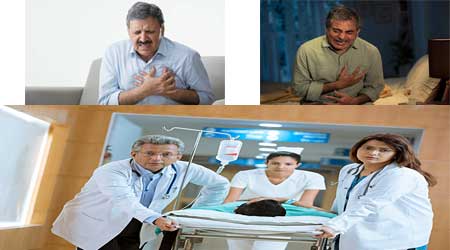What is Heart Attack?
Heart attack is death of a segment of cardiac muscle caused by a loss of blood supply. The blood supply is typically stop when an artery supplying the cardiac muscle is blocked by a grume. |
| Heart Attack: Symptoms, Causes, Treatment and Prevention |
Heart Attack Symptoms:
Heart Attack: Symptoms| There are clear symptoms of a attack that need immediate medical attention.A feeling of pressure, tightness, pain, squeezing, or aching within the chest or arms that spreads to the Shoulder , jaw, or back are often a symbol that an individual has a attack The following are other possible signs and symptoms of a attack occurring:
- coughing
- nausea
- vomiting
- Chest pain
- dizziness
- shortness of breath called dyspnea
face seeming grey in color,a sense of Panic that life is ending feeling awful, generally restlessness feeling cloggy and sweaty shortness of breath
Changing position doesn't alleviate the pain of a attack . The pain an individual feels is generally constant, although it's going to sometimes come and go.
Changing position doesn't alleviate the pain of a attack . The pain an individual feels is generally constant, although it's going to sometimes come and go.
Warning signs:
As heart attacks are often fatal, it's vital to acknowledge the warning signs that an attack is happening .
American Heart Association (AHA) enlisted four warnings as being crucial signs of an attack. These include:
discomfort, pressure, squeezing, or fulness within the chest that lasts several minutes or resolves then returns,
pain or discomfort within the arms, neck, back, stomach, or jaw
sudden shortness of breath
Other signs can include a chilly sweat, a sick or nauseous feeling, or being lightheaded.
When an individual has these symptoms, immediately should contact Emergency services.
American Heart Association (AHA) enlisted four warnings as being crucial signs of an attack. These include:
discomfort, pressure, squeezing, or fulness within the chest that lasts several minutes or resolves then returns,
pain or discomfort within the arms, neck, back, stomach, or jaw
sudden shortness of breath
Other signs can include a chilly sweat, a sick or nauseous feeling, or being lightheaded.
When an individual has these symptoms, immediately should contact Emergency services.
Complications:
There are two sorts of complications which will happen following attack . the primary occurs just about straightaway and therefore the second happens afterward .
Immediate complications
- Arrhythmias: the pulse irregularly, either too fast or too slowly.
- Cardiogenic shock: a person’s BP drops suddenly and therefore the heart cannot supply enough blood for the body to figure adequately.
- Hypoxemia: levels of oxygen within the blood become too low.
- Pulmonary edema: fluid accumulates in and round the lungs.
- DVT or deep vein thrombosis: the deep veins of the legs and pelvis develop blood clots that either block or interrupt the flow of blood within the vein.
- Myocardial rupture: the cardiac attack damages the wall of the Heart , meaning an increased risk of a heart wall rupture.
- Ventricular aneurysm: a heart chamber, referred to as a ventricle, forms a bulge.
- Complications which will occur later
- Aneurysm: connective tissue builds abreast of the damaged heart wall, resulting in blood clots, low vital sign , and abnormal heart rhythms.
- Angina: not enough oxygen reaches the cardiac cell , causing pain .
- Congestive heart failure: the pulse can very weakly, leaving an individual feeling exhausted and breathless.
- Edema: fluid accumulates within the ankles and legs, causing them to swell.
- Loss of erectile function: male erecticle dysfunction is usually caused by a vascular problem. However, it also can be the results of depression.
- Loss of libido: a loss of sexual drive can happen, especially within the case of men.
- Pericarditis: the liner of the guts becomes inflamed, causing serious pain .
Treatment:
Most people will need several sorts of medications or treatments after a attack . The aim of those measures is to stop future heart attacks occurring.
They'll include:
aspirin and other antiplatelets
beta blockers
ACE (angiotensin converting enzyme) inhibitors
statins
angioplasty
CABG or arteria coronaria bypass graft
Prevention
The best way of preventing a attack is to possess a healthy lifestyle. Measures for healthy living include the following:
Avoid smoking,
- eating a balanced, healthful diet.
- Practice to do physical exercise Daily.
- Take a sound sleep.
- keeping diabetes in check.
- keeping alcohol intake down.
- maintaining blood cholesterol at optimum levels.
- keeping BP at a secure level.
- maintaining a healthy weight.
- avoiding stress where possible.
- learn how to manage stress.
Conclusion: I hop this post help you know about Heart Attack: Symptoms, Causes, Treatment and Prevention








No comments:
Post a Comment